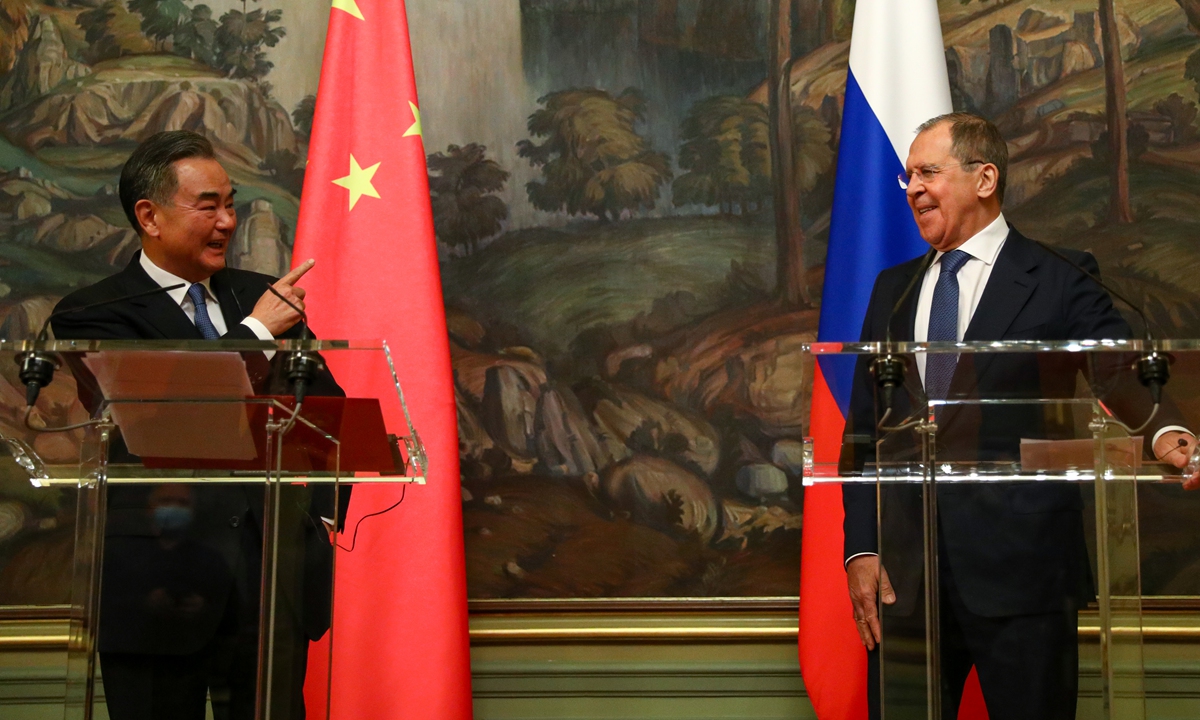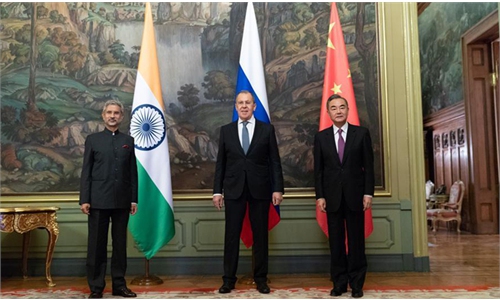
Chinese State Councilor and Foreign Minister Wang Yi (left) and Russian Foreign Minister Sergei Lavrov hold a joint press conference following their talks in Moscow on Friday. Photo: AFP
China and Russia issued a joint foreign ministers' statement after Chinese State Councilor and Foreign Minister Wang Yi met Russian Foreign Minister Sergei Lavrov on Friday in Moscow, calling on all countries to uphold multilateralism and firmly oppose unilateralism, protectionism and hegemony.
Observers said China and Russia have been playing an increasingly important role in improving the US-dominated world order. They have also recently confronted Western countries head-on on a number of international issues, including voting against the US resolution to extend a 13-year-old arms embargo on Iran at the UN in August.
The statement was based on common views on the current international situation and major issues, and called on the international community to strengthen coordination, build consensus, and work together to tackle current threats and challenges, and promote global political stability and economic recovery.
The 12-point statement called on all governments, social organizations and enterprises to work together to fight fake information, as certain countries spread disinformation that threatens the health of people of different countries, social stability and order amid the COVID-19 pandemic.
China and Russia also reiterated their firm commitment to multilateralism, calling on the international community to safeguard the international system with the UN at its core, and the international order based on international laws. Adhering to the Cold War mentality, hyping competition among major powers, and pursuing one's own security at the expense of the security of other countries have seriously undermined the basic norms governing international relations and global and regional strategic stability and security, the statement said.
At Thursday's meeting of the Shanghai Cooperation Organization (SCO) Council of Foreign Ministers, Wang also stressed the necessity of never to allow a "color revolution" to succeed in the region at a SCO meeting.
"We must firmly establish a sense of a community with a shared future for mankind, firmly support each other in following a development path that suits one's own national conditions, as well as maintaining political security and social stability, and never allow external forces to interfere in the internal affairs of SCO member countries, a 'color revolution' to succeed in this region, or the regional peace and stability to be undermined," he said.
Li Haidong, a professor at the Institute of International Relations of the China Foreign Affairs University, told the Global Times on Friday that the "color revolution" with the involvement of the US and the West poses a great challenge to the SCO and emerging economies, and can drag the countries into the abyss, and disrupt benign development.
"It is necessary for all SCO members to work together to avoid what has happened in Ukraine, and what is happening in Belarus," he said.
Belarus is experiencing social unrest, and some Belarus experts believe that it's a "color revolution" with interference of foreign forces, media reported.
Disguised as promoting democracy, a "color revolution" is a way for the US and the West to change regimes and achieve strategic goals in other countries since the start of the 21st century, analysts said. They said after Donald Trump assumed office, US unilateralism and hegemony became increasingly prominent, bringing greater "color revolution" risks to the world. What happened in Hong Kong last year is also an example, analysts said.
Li noted that SCO members should actively share intelligence and other resources to avoid "color revolutions." "Countries like China and Russia which have successful experiences in preventing 'color revolutions' can share their experiences with other members."


